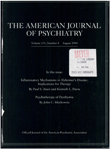Effect of instructional cues on schizophrenic patients' performance on the Wisconsin Card Sorting Test
Abstract
OBJECTIVE: Schizophrenic patients are particularly deficient on measures of executive functioning, notably the Wisconsin Card Sorting Test. This study was conducted to determine the efficacy of a cuing strategy in facilitating performance on this cognitive measure of the integrity of prefrontal brain structures and functioning. METHOD: Twenty-four schizophrenic inpatients and 24 demographically matched inpatients with mood disorders were administered the Wisconsin Card Sorting Test either with instructional cues at the beginning of the task or with the standard administration procedure. RESULTS: There was a significant benefit of cues for the patients with affective disorders as well as for the schizophrenic patients. The schizophrenic subjects in the uncued condition maintained poor but stable performance throughout the course of the task. CONCLUSIONS: The study suggests that the deficit in executive functioning of schizophrenic patients may lie in the formation of concepts, not in their application.
Access content
To read the fulltext, please use one of the options below to sign in or purchase access.- Personal login
- Institutional Login
- Sign in via OpenAthens
- Register for access
-
Please login/register if you wish to pair your device and check access availability.
Not a subscriber?
PsychiatryOnline subscription options offer access to the DSM-5 library, books, journals, CME, and patient resources. This all-in-one virtual library provides psychiatrists and mental health professionals with key resources for diagnosis, treatment, research, and professional development.
Need more help? PsychiatryOnline Customer Service may be reached by emailing [email protected] or by calling 800-368-5777 (in the U.S.) or 703-907-7322 (outside the U.S.).



